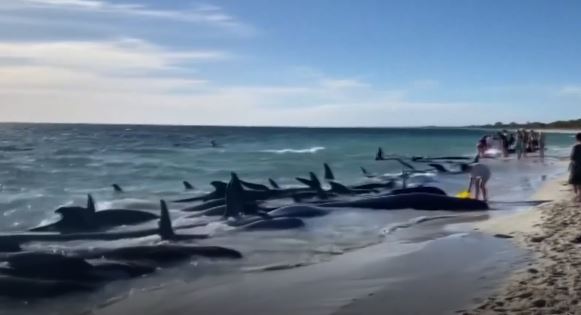The picturesque shores of Western Australia were marred by a distressing sight on Thursday as more than 100 long-finned pilot whales found themselves stranded. Despite valiant efforts from wildlife officials and volunteers, the ordeal resulted in the tragic loss of 29 whales, while the remainder were successfully guided back to the ocean.
Pia Courtis, a regional wildlife officer with the Parks and Wildlife Service for Western Australia, provided updates during a news conference shared on social media. Efforts were underway to handle the deceased whales, with plans in place to collect biological samples and measurements for research purposes.
As marine officials and volunteers rallied to assist the stranded whales, boats patrolled the waters, and a spotter plane kept a watchful eye to prevent any potential return to shore. The collaborative endeavor aimed to ensure the safety and well-being of the vulnerable creatures.
The distressing scene unfolded along the shores of Toby Inlet, near the town of Dunsborough, with four pods comprising approximately 160 pilot whales sprawled across a stretch of about 1,640 feet of beach. Local wildlife officials shared images on social media, depicting rows of stranded whales and onlookers gathered in solemn observation of the somber event.
Following concerted efforts, the rescued whales were successfully guided back to deeper waters, offering a glimmer of hope amidst the tragedy. The wildlife department reported that the whales had moved further offshore and were last observed traveling northward, away from the perilous shallows.
Pia Courtis expressed cautious optimism, stating, “So far, so good — they haven’t made it back to shore, but we will keep monitoring them.” Vigilance remained paramount as authorities remained vigilant in ensuring the continued safety of the pod.
The cause of the stranding remained shrouded in mystery, with the affected whales predominantly comprising adult females alongside a few calves. Speculations regarding the causes of such events include the possibility of whales following a sick or distressed member of their pod, confusion arising from human-induced underwater noise pollution, or attempts to evade predators.
Tragically, Australia has witnessed several mass strandings in recent years, underscoring the vulnerability of these majestic creatures. In a similar incident in July, nearly 100 long-finned pilot whales were stranded off the coast of Western Australia, resulting in substantial casualties.
Among Australia’s most devastating strandings was the 2020 incident in Tasmania, where a staggering 470 whales found themselves beached, leading to widespread loss of life. Such events serve as poignant reminders of the fragility of marine ecosystems and the urgent need for conservation efforts.
Pilot whales, known for their sociable nature, typically inhabit large schools comprised of hundreds of individuals, organized into tight-knit pods. The National Oceanic and Atmospheric Administration highlights the species’ strong social bonds, which may contribute to the tendency for mass strandings during times of distress.
Rescuers faced a race against time to guide the stranded whales back to the ocean, recognizing the inherent risks associated with prolonged exposure to the elements. Once out of the water, the weight of their bodies can exert immense pressure, potentially leading to organ damage.
Amidst the tragedy, the successful return of the stranded pilot whales to the ocean serves as a testament to the tireless efforts of wildlife officials, volunteers, and concerned citizens. However, the incident underscores the need for continued vigilance and proactive conservation measures to safeguard these magnificent creatures and preserve the delicate balance of marine ecosystems.

